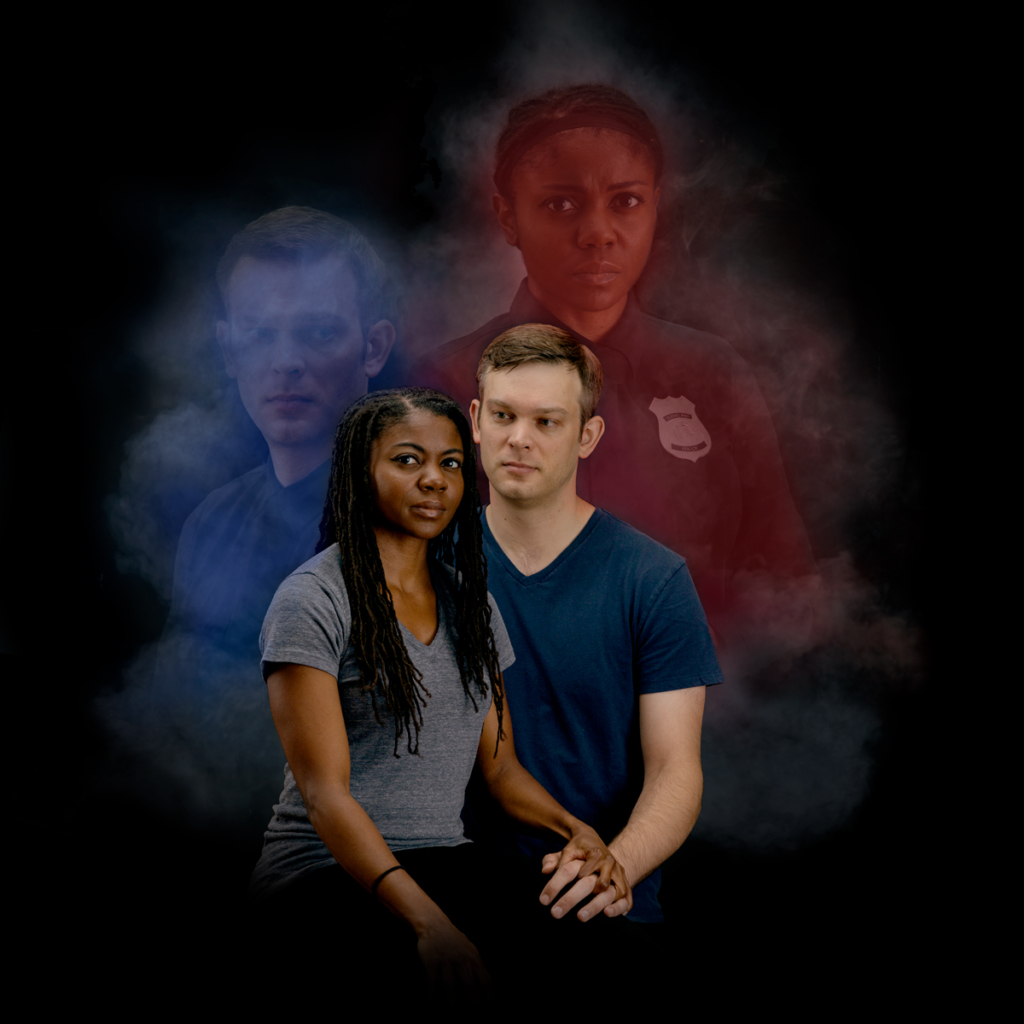
 [rating=5]Impressive, timely, and provocative, the Chicago premiere of “Sheepdog” is nothing short of amazing! Meticulously scripted by Kevin Artigue and expertly directed by Wardell Julius Clark, this intense 90-minute roller coaster ride of emotions will leave you breathless.
[rating=5]Impressive, timely, and provocative, the Chicago premiere of “Sheepdog” is nothing short of amazing! Meticulously scripted by Kevin Artigue and expertly directed by Wardell Julius Clark, this intense 90-minute roller coaster ride of emotions will leave you breathless.
“Sheepdog” consists of only two actors. It is a cleverly executed nonlinear play, told through the eyes of Amina (an outstanding and powerful performance by Leslie Ann Sheppard). She is a dynamic black woman who works as a police officer and becomes romantically involved with Ryan, a fellow officer who is white (skillfully portrayed by Drew Schad). “You’re my person” she calls him from the moment they first meet at a barbeque. She is enamored by his good nature, handsome features, and overwhelming kindness; later she is the recipient of his care after her job-related physical injury. The audience is lulled into an easy comfort of witnessing a romantic comedy about two people with similar values but where—as the cliché goes—opposites attract. But their romantic dalliance becomes the runup to a gutsy hard-ass look at race relations within the Cleveland Police Department and between the black and white communities which they serve. The dense interweaving of their personal and professional lives provides us with an intimate take on the meaning of police-involved shootings in communities of color that we hear about on the news nearly every day.
Reverse—Fast Forward—Stop—Play—Skip—Go Back to the Beginning: All these commands are used to play back police body-cam and dash-cam video, and cell phone video. These are the same commands that Amina gives to her brain as she plays and replays events that have gotten her to the point of questioning her own judgment and that of her lover Ryan. In this way, she searches herself for evidence of Ryan’s possible culpability in killing Brandon Mayfield, a 19-year-old black man, who was home from college and who was possibly frightened during a routine traffic stop. Supported by innovative and fluid scenic design by Sydney-Lynne Thomas (complete with sliding sets and furniture), creative videography and pointed projection design by Smooch Medina, original music and interactive soundcraft by Christopher Kriz, and stirring lighting by Jason Lynch, Amina’s visions of the mind propel us in a fiery, jerky, jump-cut fashion from the moment she takes the oath to become a Cleveland police officer to the day she hates Ryan’s guts. When she and Ryan merge their private lives with the public performance of their policework, what’s left are the decaying dreams, ambitions, and futures of both.
“Sheepdog” is razor-sharp; the emotions are raw. The actors vividly express their passions and plights throughout their entire bodies: with Ryan’s shaking and his losing control, and Amina’s defiant yet compelling stares—sure and unsure of herself at exactly the same time.
Above all, this is a story about trust: Who do you trust and why? And what constitutes evidence that would cause you not to trust a person or the police? A video? A loved one’s recollections? A witness’s testimony? Your own imperfect 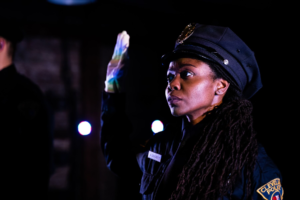 memories?
memories?
The name “Sheepdog” is taken from a book that Ryan wants to read: a social commentary about wolves versus sheep, such that those with guns are the sheepdogs, without whom our citizens would become easy prey.* Ryan has, in part, chosen to become a police officer to root out the wolves, the undesirables. Amina, however, doesn’t buy into this frame of reference, and in sharp contrast, believes that this sort of talk of wolves and sheep is racist. “I won’t read it,” says Ryan when she objects to the book, with the implication that “If you don’t want me to… and I love you… I’ll do what you say.” But in their brief exchange, it becomes obvious that Amina sees the truth of the world very differently from Ryan. Her implication is this: Whites may not be oblivious to racism, but there is a subtlety which whites often do not recognize. You have to identify what racism is in people’s hearts and minds before it can potentially be eliminated in society. To confront it, you must first be attuned to it.
The tour through Amina’s mind is unrivaled, especially in dealing with matters of personal conscience. The Reverend Dr. Martin Luther King once said, “The time is always right to do the right thing.” But what exactly is the right thing? Both Ryan and Amina play fast and loose with proper police procedures and codes of conduct to obtain what each perceives to be evidence of the truth. For Ryan, an offender will most likely remain an offender; for Amina, juveniles grow up and change; one cannot prejudge a person by their past actions. For each, criminal intent is based on differing perceptions of who is presumed to be the wolf and who is presumed to be the sheep. The divide proves to be insurmountable in the context of this play.
But how do we get past the imperfect lens of our own subjectivity? I would argue that the audience finally does obtain the larger truth, the One Truth that is not Ryan’s truth—or Amina’s: It is the fact that there is an unspoken morality and search for goodness that transcends all. But it is far easier to find this clear-cut truth within oneself than to act on it outwardly, in part, because institutions are wont to change: specifically (in this instance), the Cleveland Police Department. So while Amina and Ryan have each sworn an oath to uphold impartial law enforcement, there are always questions: “Can they really be impartial?” “Isn’t there usually some moral ambiguity?” Both work within an institution that has its own policies and procedures plus its own organizational biases and culture. This includes the “blue code of silence” where officers will not admit to each other’s misconduct—assuming that it occurs.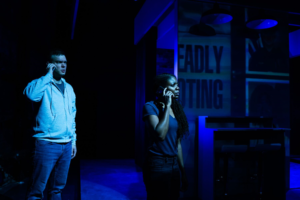
Two characters on a small stage can have a great impact in making us reflect deeply on the world at large. By casting a spotlight on one couple in Cleveland, the production casts a floodlight on how our nation may have gotten to this point in our history regarding unconscious racism as it relates to law enforcement in the African-American community. Perhaps this play can help point the way as to how institutions of public trust need to change—and how each of us as individuals need to change our perspectives too. Just note that the answers are not as simple as black and white!
In all, with incredible acting, magnificent timing, awesome directing, and a phenomenal script, “Sheepdog” is a triumph of theatre: not just for Black History Month but for our turbulent times.
(*Note: The concept of a sheepdog is mentioned in, among other places, Alex Griswold’s June 16, 2016 online article in Mediaite.com where he interviews shock-jock Howard Stern: “Stern borrowed a common analogy used by a lot of Navy SEALs, that civilians are ‘sheep’ who will be preyed upon ‘wolves’ unless [the sheepdogs] protect them.”)
The Shattered Globe Theatre’s production of “Sheepdog” is playing at the Theater Wit, 1229 W. Belmont Avenue, Chicago, through February 29, 2020.
Performance schedule:
Thursdays, Fridays, and Saturdays – 8:00 p.m.
Sundays – 3:00 p.m.
Added performance: Saturday, February 29 – 3:00 p.m.
Touch Tour/Audio Description Performance: Friday, February 7 – 6:45 p.m. touch tour, 8:00 p.m. performance with audio description. $20 tickets available with code “ACCESS.”
Industry performance night: Monday, February 10 – 7:30 p.m.
Tickets:
General admission – $42
Seniors – $35
Under 30 years old – $25
Student rush tickets available day of performance – $15
Industry tickets – available Thursdays and Fridays with code “INDUSTRY” – $15
Tickets can be purchased in person at the Theater Wit Box Office or by calling 773-975-8150 or online at www.shatteredglobe.org. Group discounts are available by contacting groupsales@shatteredglobe.org or by calling 773-770-0333.
Shattered Globe Theatre will be hosting post-show discussions immediately following 3:00 p.m. performances on Sundays.
To see what others are saying, visit www.theatreinchicago.com, go to Review Round-Up and click at “Sheepdog”.


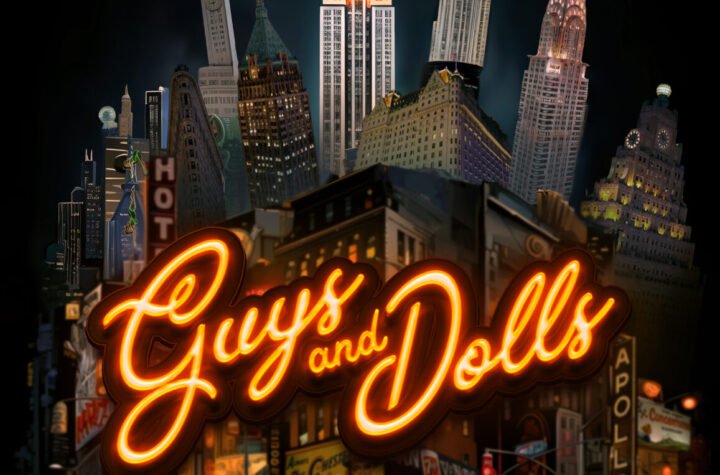
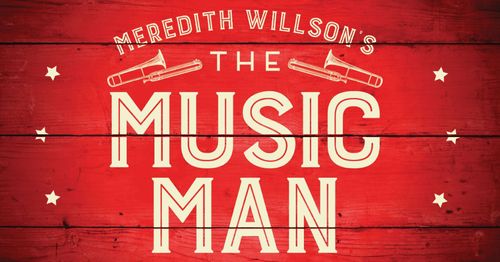


More Stories
“Guys & Dolls”
“The Music Man”
“The S Paradox” reviewed by Julia W. Rath